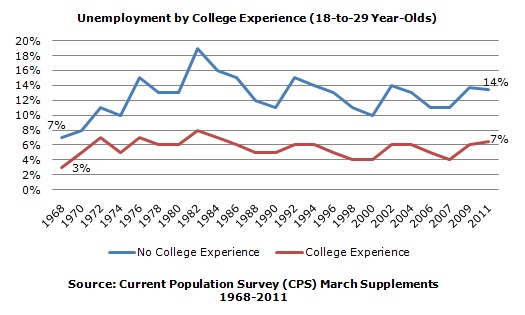Youth Unemployment and Civic Engagement
It’s hard to ignore the rhetoric in newspapers these days about youth, especially the wealth of articles about college graduations and the economy grads are entering into. As the economy gets better, more and more youth are being described as “freeloaders,” narcissistic,” and “slackers.” I don’t think that’s a fair assessment of who youth are. In fact, young people are giving back, are volunteering at much higher rates than the 1970s and ‘80s, and are participating in ways that are less institutionalized (such as neighboring).
Another question to consider is who among the youth population is the economy getting better for? As the graph below shows, unemployment is steadily declining, but young people without college experience are still experiencing unemployment rates double that of young people with college experience.
Employment in the transition to adulthood is important for many different reasons. In relationship to civic life, research shows that “bouts of unemployment (even if brief), and especially earlier in one’s career, had a life-long effect in reducing social participation such as church attendance and involvement in youth or community organizations” (Lim and Sander, 2010). Knowing this, unemployment could be an added barrier for engagement among young people without college experience, who already receive fewer opportunities to be involved through institutions such as school.
– Surbhi Godsay






